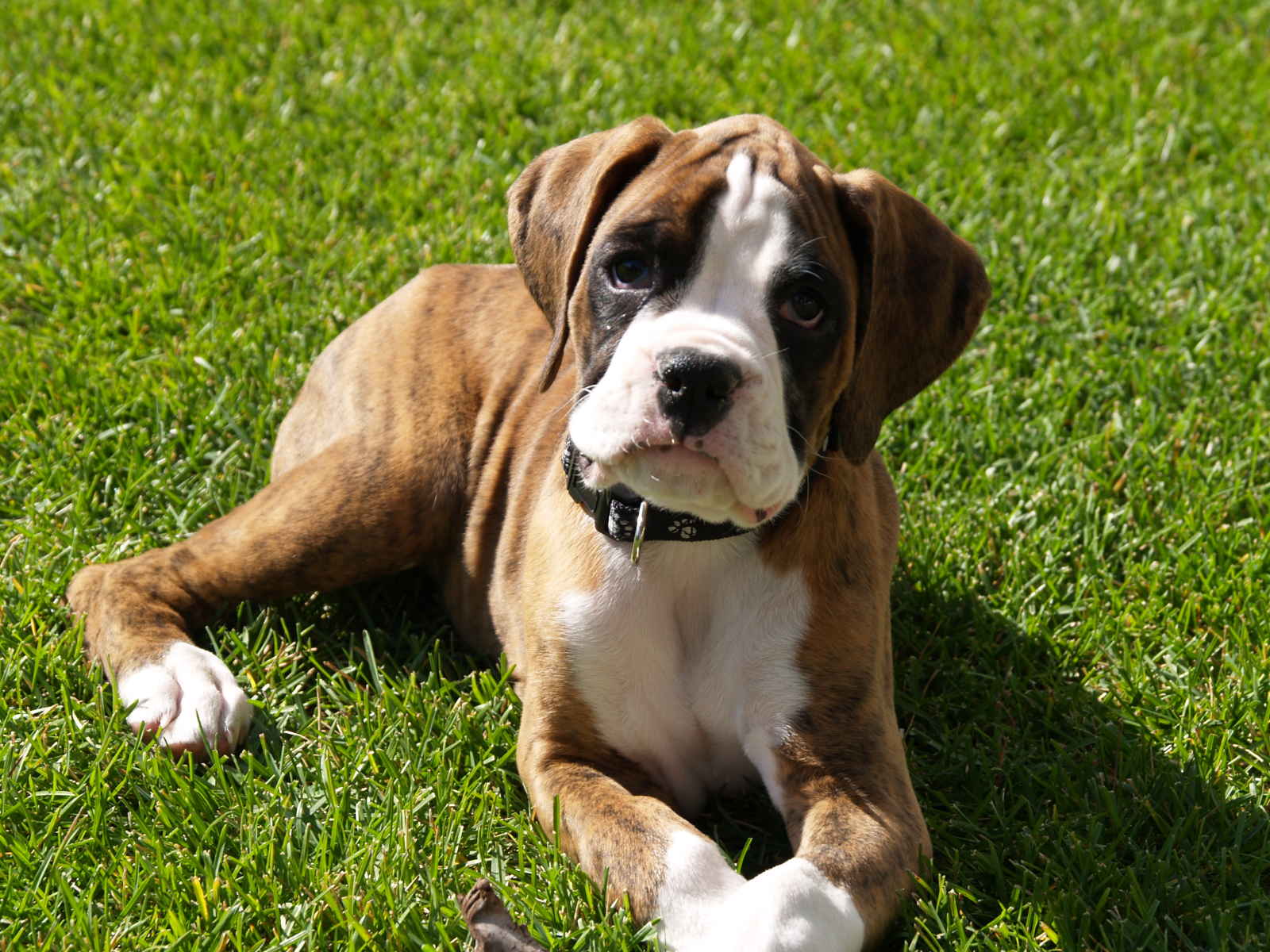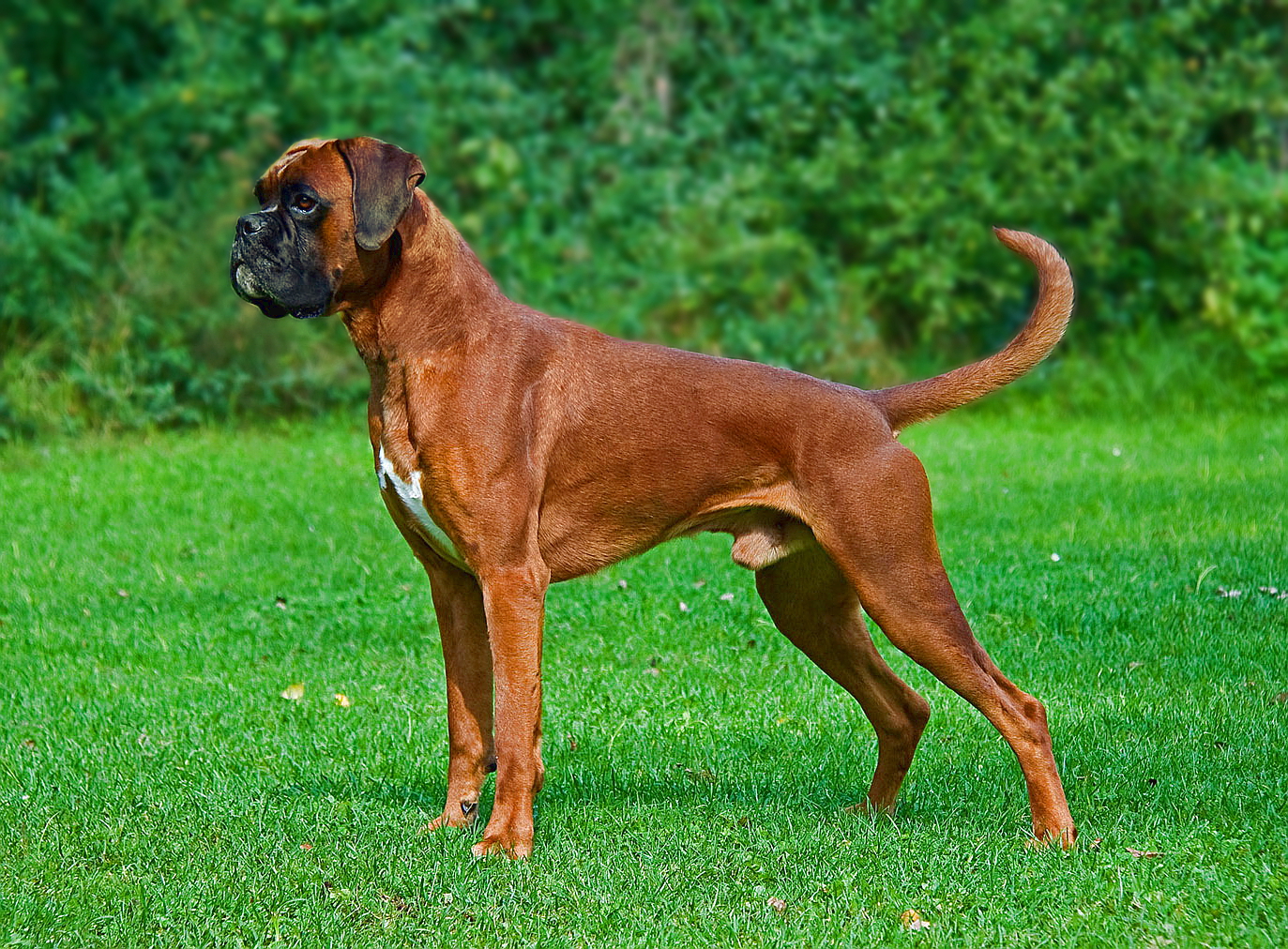
The Boxer is a strong, energetic, and affectionate breed that originated in Germany in the late 19th century. Developed from the now-extinct Bullenbeisser (a type of mastiff) and various bulldog breeds, Boxers were originally used for hunting large game like boar and deer. Later, their intelligence, protective instincts, and loyalty made them popular as guard dogs, police dogs, and family companions.
Boxers gained international recognition when German Boxers served in World War I and II as messenger dogs, guard dogs, and ambulance dogs. Their bravery and trainability made them invaluable in war efforts. The breed was officially recognized by the American Kennel Club (AKC) in 1904 and quickly gained popularity in the United States and around the world. Today, they are one of the most beloved family pets and working dogs.
Popularity of the Boxer
The Boxer consistently ranks among the top 10 most popular dog breeds in the United States. Their loyal, intelligent, and playful nature makes them a favorite among families, law enforcement, and even therapy dog programs.
Boxers are particularly known for their boundless energy, deep loyalty, and expressive faces, making them one of the most entertaining and affectionate breeds to own.
Boxers are medium to large-sized dogs with a muscular build and a distinctive face that gives them their signature look.
Coat: Short, smooth, and glossy, coming in colors such as fawn, brindle, and white, often with a black mask and white markings.
Size:
Males: 22 to 25 inches tall, weighing 60 to 80 pounds.
Females: Slightly smaller, weighing 50 to 65 pounds.
Head & Expression: A broad, square-shaped head with a short muzzle, strong jaw, and dark, expressive eyes that give them a playful and alert expression.
Ears: Naturally floppy but often cropped to stand erect in some regions.
Body: A muscular, well-proportioned build with a deep chest, strong legs, and a high-set tail (which may be docked).
Boxers are fun-loving, loyal, and full of energy, making them an ideal choice for active families and individuals.
Playful and Fun-Loving: Boxers are often called the "clowns of the dog world" due to their goofy antics and boundless enthusiasm.
Loyal and Protective: Their natural guarding instincts make them excellent family protectors.
Energetic and Athletic: This breed thrives on exercise, play, and interactive activities.
Affectionate and Friendly: Boxers form deep bonds with their families and are gentle with children.
Intelligent but Stubborn: While highly trainable, Boxers can have a stubborn streak, requiring patience and consistent training.

Boxers are ideal for those seeking an active, affectionate, and protective dog.
• Great for Families: Boxers are gentle, patient, and playful with children.
• Loyal and Protective: Their natural guarding instincts make them excellent watchdogs.
• Intelligent and Trainable: With proper training, Boxers excel in obedience, agility, and even police work.
• Playful and Loving: Their clownish personalities bring joy to any household.
• Minimal Grooming Needs: Their short coat requires very little maintenance.
Boxers need plenty of exercise, mental stimulation, and regular health checkups to stay happy and healthy.
• Grooming: Weekly brushing removes loose hair and maintains a healthy coat.
• Exercise: Boxers need at least 1 to 2 hours of exercise daily, including running, fetch, and agility training.
• Mental Stimulation: Engage them in training, puzzle toys, and interactive games to keep their minds sharp.
• Nutrition: A protein-rich diet supports their muscular build and high energy levels.
• Training and Socialization: Early training and socialization help prevent stubbornness and over-excitement.
Boxers are generally healthy dogs, but they are prone to some genetic health conditions.
• Brachycephalic Syndrome: Due to their short snouts, Boxers may struggle with breathing issues, especially in hot or humid weather.
• Hip Dysplasia: A common condition in larger breeds that can lead to mobility issues.
• Heart Disease: Boxers are prone to aortic stenosis, a congenital heart condition.
• Cancer: Unfortunately, Boxers have a higher risk of developing tumors and cancers compared to other breeds.
• Bloat (Gastric Torsion): Like other deep-chested breeds, Boxers are at risk for bloat, which can be life-threatening.

Boxer vs. Bulldog: The Boxer is more athletic and energetic, requiring more exercise and mental stimulation.
Boxer vs. Doberman: The Boxer is more playful and clownish, whereas Dobermans are more serious and protection-focused.
Boxer vs. Labrador Retriever: Boxers are more protective and independent, while Labs are more social and eager to please.
The Boxer is an excellent choice for active individuals, families, or anyone looking for a loyal, protective, and fun-loving companion. If you can provide daily exercise, training, and companionship, a Boxer will be a devoted and loving member of your family.
However, if you prefer a low-energy, low-maintenance dog, or live in a very hot climate, the Boxer may not be the best fit.
🦴 Are Boxers good family dogs?
Yes! Boxers are loyal, affectionate, and great with kids, making them excellent family pets.
🏡 Can Boxers live in apartments?
Boxers can adapt to apartment living, but they need plenty of exercise to stay happy.
⚡ How much exercise does a Boxer need?
Boxers need 1 to 2 hours of exercise daily to stay healthy and prevent boredom-related behaviors.
🐕 Are Boxers easy to train?
Boxers are intelligent but stubborn, so early training and consistency are key.
🌡️ Do Boxers handle hot weather well?
No. Due to their short snouts, Boxers can struggle in hot and humid weather. Keep them cool and hydrated.
United Pet Club is here to help you find the perfect Boxer companion. Whether you're looking to adopt or connect with trusted breeders, we provide valuable resources to guide you every step of the way.
👉 Explore our platform to learn more about Boxers, their history, and how to care for them. Contact United Pet Club today to start your journey with this playful and loyal guardian!